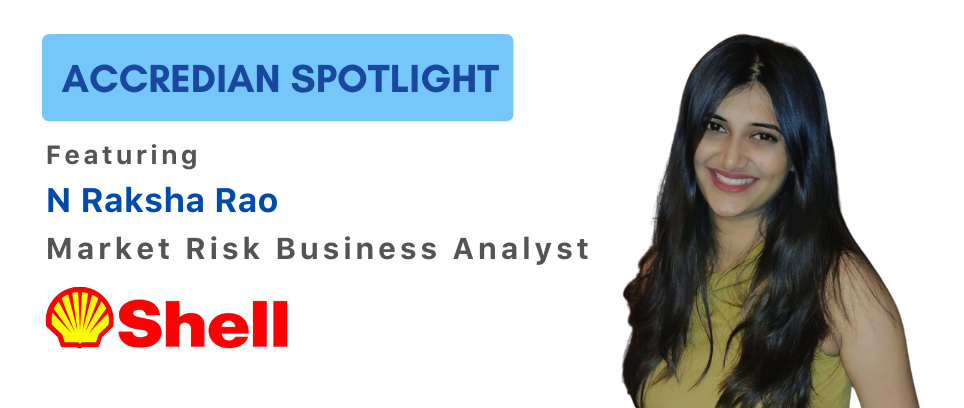In this Accredian Spotlight interview, we feature N Raksha Rao, who is a Market Risk Business Analyst at Shell. Her passion for learning led her to join the Global Certificate in Product Management, at Accredian.
Question 1: Which program & batch are you part of at Accredian & tell us more about your current work profile?
Raksha: I belong to the PGDM, September 2021 batch. I am a B.E Computer Science graduate and an early career professional with 1.4 years of experience at Shell India Markets Private Limited.
Prior to Shell, interned at Hewlett Packard Enterprises. In HPE, I worked as a DevOps intern where I gathered learnings on the SAFe framework, DevOps Infrastructure elements, along with hands-on experience on Rally and Jira.
This was my first stint at writing Product Backlog Items with the Product Owner and how they eventually rolled up to epics and themes at an organizational level.
For the first 6 months in Shell, I initially worked as a Data Engineer/Analyst within Shell Retail. Here I understood the importance of data in Shell Real Estate Networks, and how it eventually helped in providing insights in the form of business intelligence.
My second/current assignment in Shell is that of a Market Risk Business Analyst, where I work on understanding global reporting requirements from teams sitting across the world.
I convert these business requirements to technical requirements and thereby help with developing and deploying reports. I also help the Product Owner to define Product Backlog items, help with effort estimation, and ultimately with the direction of the Market Risk Reporting platform.
Question 2: Walk us through your career journey & what got you interested in Product Management?
Raksha: In college, when it came to any project or hackathon or business use case competition, I was always on the forefront of the functional/business side of the event. I would be the one who would worry about the UX of the product we build, the outcome of the initiative, the value proposition and how it would ultimately impact the needs of the end users.
I came across Product Management as a field in my final year of college, when I went to a product pitch competition held in my college, where the judges were all Product Managers from different companies/startups.
They explained the roles and responsibilities of a PM and I instantly knew that I encompass those behaviors and that I would enjoy those tasks of being the ‘voice’ of the Customer, deriving product strategy from the company’s vision and being extremely outcome based.
By then, I had already received an offer from Shell. I resorted to looking at product management articles, blogs, courses to increase my learning and knowledge of the domain, before I start to apply for PM roles. This then led me to Accredian’s Product Management course.
I hope to take my understanding of technology, empathy for users and my passion for data to make product decisions as well as my strong analytical and communication skills to drive product teams forward and build products users love.
Question 3: What all Product Management concepts, frameworks & tools have you mastered in your program at Accredian so far?
Raksha: There were a variety of Product management tools and frameworks that I came across during my Accredian journey and also through the blogs and articles that I have gone through. They are:
- Prioritization frameworks: RICE, MoSCoW, Kano Model, Weighted decision matrix
- Collaboration apps: Mural, Notion
- Product Plan: Product Backlog and Roadmap
Question 4: What are some of the initial challenges when you got started on your Product Management journey and how did you overcome it?
Raksha: Being a fresher, the main challenge that I experienced was that I had no experience. After extensive research and networking Product Managers in the industry, I realized that I would need at least a few years of experience before I land an Associate Product Manager role as a start.
I began to look for a structured way to kickstart my Product Management journey, apart from the blogs and articles that I had been reading. That is when I came across Accredian’s PM course.
Another problem which I faced is that I did not have a portfolio to share along with my resume. I now use Notion to prototype any product ideas or wireframes that I want to develop.
Having covered a variety of topics across 2 terms, I am now confident with how I should approach Product Thinking and how I can apply Product Thinking to prepare for interviews and also within my current role.
Question 5: Who is your favorite faculty at Accredian and what did you learn from them the most?
Raksha: I have had only one faculty member- Mr Prahlad Modi. The one thing that I really appreciate learning from him is to always approach every challenge by using the First Principles way of thinking.
Question 6: In your view, what is the goal of Product Management and how has it evolved in the last few years?
Raksha: Product Management is the one field that accommodates a role which spans across many activities from strategic to tactical and provides important cross-functional leadership, most notably between engineering, marketing, sales and support teams.
It is one of the teams that tracks the larger objective of an organization and executes them in the form of products. In the past, Product Management as a business vertical was observed only in well-established Silicon Valley companies (FAANGM).
Nowadays, every service based company and startup has understood the value and importance of Product Management and has an established product team.
Question 7: What are the current trends in Product Management that you are most excited about?
Raksha: Some of the current trends that I am most excited about are no-code dev tools. Coding has always been that one caveat that used to act as an obstacle for most PMs to express their UI and functional ideas.
But low-code and no-code tools have solved that problem for PMs without technical backgrounds as well.
Question 8: Which are some of the Product Management blogs, podcasts, communities, & channels that you follow?
Raksha: Some groups I am a part of:
- The Product mastermind
- PM School
Articles/blogs/channels:
- Learnpmwithme
- Dr. Bart Jaworski’s Breaking into Product Management – Youtube Channel
- Airflow
Question 9: Please tell how your journey has been with Accredian so far and what are the elements that you liked.
My journey with Accredian has been pivotal in building my basics in Product Management, especially in term 2- ‘Product strategy and road mapping’.
Question 10: What is your advice to anyone wanting to start a career in Product Management?
Raksha: For anyone who is starting out in Product Management, the best way to go about it is to try and look at any product that you use in your day-to-day life and trace the thought process of the product manager that built it.
Apply all concepts from Product Discovery to Launch and try to envision the product’s different phases. Pick a product you’re passionate about, develop a wireframe using any collaboration/no-code/low-code tool.
Apply design thinking processes and UI/UX principles to envision the product in your own way and what you could have done better.
Reading PM articles in a structured manner goes a long way in your PM education. Every time you come across an interesting article, try to classify them into the different elements in Product Management, like- Product Strategy, Product Analytics, First Principles and so on.
This helps in easy retrieval of articles/blogs while preparing for interviews.
Hope you enjoyed reading this interview. If you want to read more such interesting student stories, check out Accredian Spotlight.




Thanks, Raksha, for taking part in the Spotlight, and my takeaway is the references you provided to the tools, frameworks, and PM Portal! All the best for your career!